If you’re looking for inspiring billionaire biographies, I recommend exploring stories like *The Accidental Billionaires* about Facebook’s early days, *Never Enough* for a heartfelt rise to success, Elon Musk’s biography for innovation insights, Mark Cuban’s resilience, and *The House of Morgan* for an in-depth exploration of finance history. These books reveal key lessons on perseverance, risk-taking, and leadership. Stay with me, and you’ll uncover why these stories can ignite your own journey to success.
Key Takeaways
- These biographies offer authentic insights into the personal struggles and resilience behind billionaire success stories.
- They highlight innovative strategies and decision-making that can inspire entrepreneurial growth.
- The books provide in-depth character studies of visionary leaders like Elon Musk and Mark Zuckerberg.
- Historical accounts, such as *The House of Morgan*, reveal systemic influence and legacy-building lessons.
- Engaging storytelling combined with credible research makes these biographies motivating and educational.
The Accidental Billionaires: The Founding of Facebook

If you’re interested in understanding how a college prank turned into one of the biggest tech giants, then “The Accidental Billionaires” is the perfect biography for you. It tells how Mark Zuckerberg, a Harvard student, created Facebook as a prank inspired by social life at Harvard. The platform quickly went viral, expanding to other campuses and attracting key partners like Eduardo Saverin and Sean Parker. Despite legal disputes with the Winklevoss twins, Zuckerberg’s focus and clever moves propelled Facebook into Silicon Valley. The story reveals how ambition, social dynamics, and strategic decisions transformed a simple idea into a multibillion-dollar empire.
Best For: readers interested in the origins of Facebook, tech entrepreneurship, and social network stories with a focus on personal and corporate dynamics.
Pros:
- Engaging narrative that captures the excitement of Facebook’s early days
- Offers insight into the personalities and conflicts among the founders
- Provides a social commentary on technology’s impact on society and morality
Cons:
- Contains inaccuracies and timeline discrepancies that may mislead
- Overly descriptive and flowery writing can detract from clarity
- Some reconstructions are imaginative, reducing factual reliability
Never Enough: From Barista to Billionaire
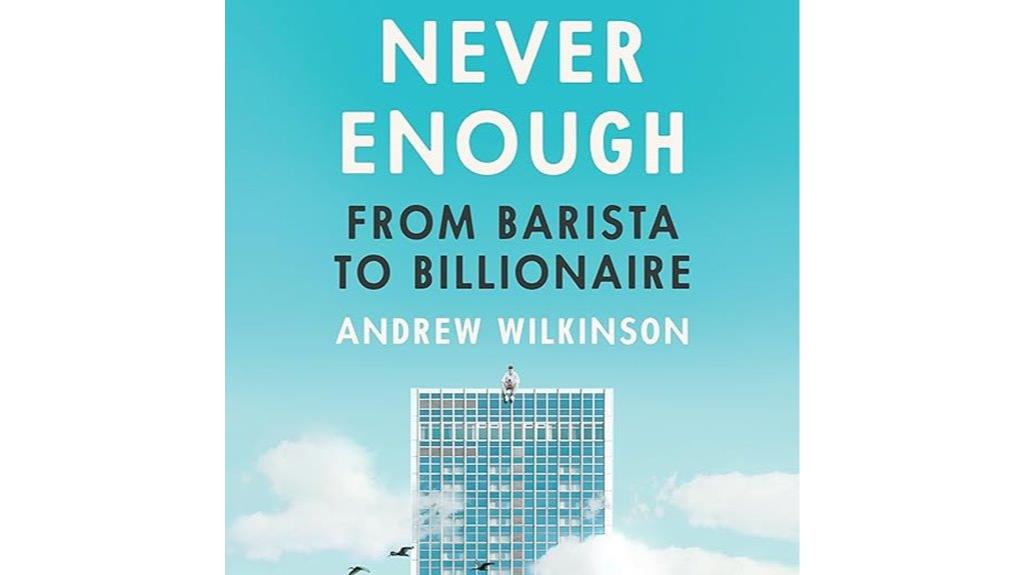
For anyone interested in authentic stories of perseverance and personal growth, *Never Enough: From Barista to Billionaire* stands out as a must-read. I was captivated by Wilkinson’s honest, first-person storytelling that vividly depicts his journey from humble beginnings to immense success. His anecdotes, struggles, and internal conflicts make the story relatable and inspiring. Wilkinson’s insights into decision-making, long-term growth, and the emotional toll of ambition offer valuable lessons. More than just a business memoir, it’s a reflection on purpose, humility, and the human side of achievement. This book truly challenges you to rethink what success means and at what cost.
Best For: aspiring entrepreneurs, ambitious individuals, and anyone interested in authentic stories of perseverance, growth, and the human side of success.
Pros:
- Engaging, relatable storytelling that combines personal anecdotes with business insights
- Candid exploration of the psychological and emotional aspects of ambition and success
- Offers practical lessons on decision-making, long-term growth, and resilience
Cons:
- Lacks specific, step-by-step business tips for immediate application
- Some readers may find the narrative focus on internal conflicts less actionable
- The philosophical reflections might be less appealing to those seeking purely technical business advice
Elon Musk
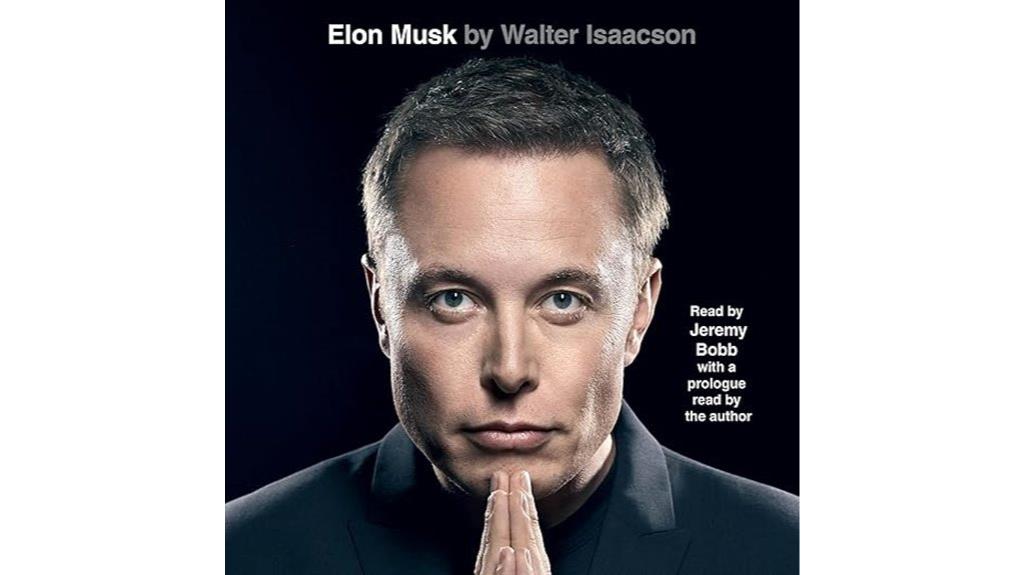
The biography of Elon Musk stands out as a must-read for anyone passionate about innovation, leadership, and the complexities of modern entrepreneurship. Walter Isaacson’s detailed account spans Musk’s life from childhood in South Africa to his current ventures, including SpaceX and Tesla. It humanizes him, revealing vulnerabilities, personal struggles, and flaws alongside his bold visions for humanity’s future. Musk’s relentless drive, risk-taking, and ambitious goals inspire, but the biography also critically examines the costs—broken relationships, autocratic tendencies, and ethical questions. This compelling narrative offers valuable lessons on pushing boundaries while reminding us of the importance of integrity and compassion.
Best For: readers interested in understanding the complexities of innovation, leadership, and the ethical challenges faced by modern entrepreneurs like Elon Musk.
Pros:
- Provides an in-depth, well-researched portrait of Elon Musk’s personal and professional life.
- Balances admiration for technological achievements with critical reflections on ethical and personal costs.
- Inspires innovation and perseverance through detailed storytelling and insights into Musk’s visionary ideas.
Cons:
- Portrays Musk as a sometimes abrasive and autocratic leader, which may be off-putting to some readers.
- Covers a vast amount of material, potentially overwhelming those seeking a quick overview.
- Critically examines darker aspects of Musk’s approach, which might detract from his inspiring accomplishments for some audiences.
Mark Cuban: The Maverick Billionaire
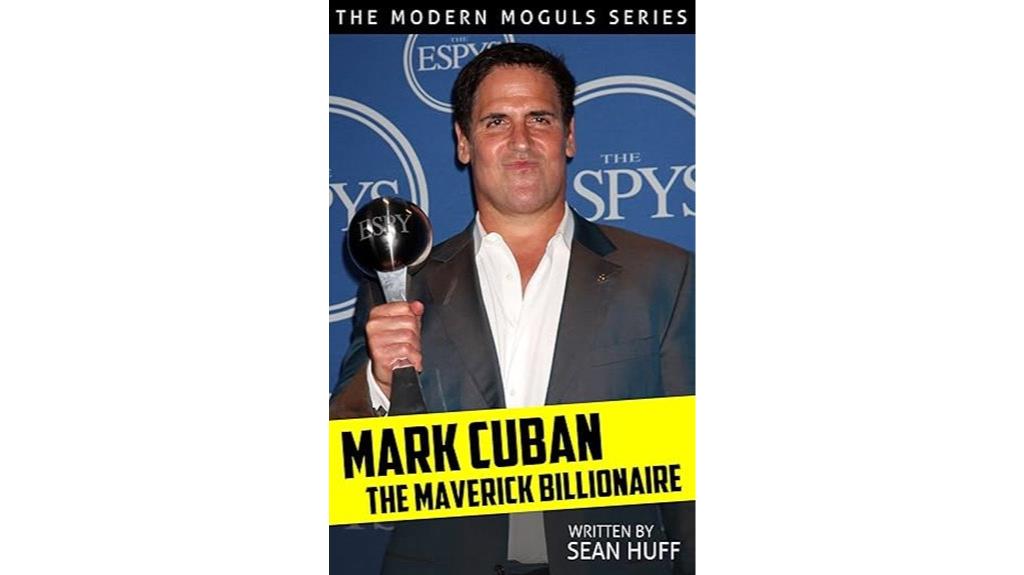
Are you looking for a biography that reveals how a self-made billionaire defies stereotypes and shows resilience? Mark Cuban’s story is exactly that. Growing up in a middle-class Jewish family, he faced early struggles but never let them define him. He took bold risks with ventures like Broadcast.com and the Dallas Mavericks, showing strategic thinking and relentless effort. Cuban’s outspoken personality often surprises people, but his honesty and kindness shine through. His journey from humble beginnings to billionaire status proves that perseverance, smart decision-making, and a fearless attitude can break barriers and inspire anyone chasing their dreams.
Best For: aspiring entrepreneurs and business enthusiasts seeking inspiration and practical insights from Mark Cuban’s journey of resilience and strategic risk-taking.
Pros:
- Offers motivational stories of overcoming adversity with perseverance and strategic thinking
- Provides practical advice on entrepreneurship, effort, and decision-making
- Highlights Cuban’s bold risk-taking and success strategies, inspiring confidence in potential investors and founders
Cons:
- Lacks deep personal insights into Cuban’s private life and inner motivations
- Contains filler content, especially on sports and basketball, which may detract from core lessons
- Some critics find the biography short and not sufficiently detailed about Cuban’s inner workings
The House of Morgan: An American Banking Dynasty
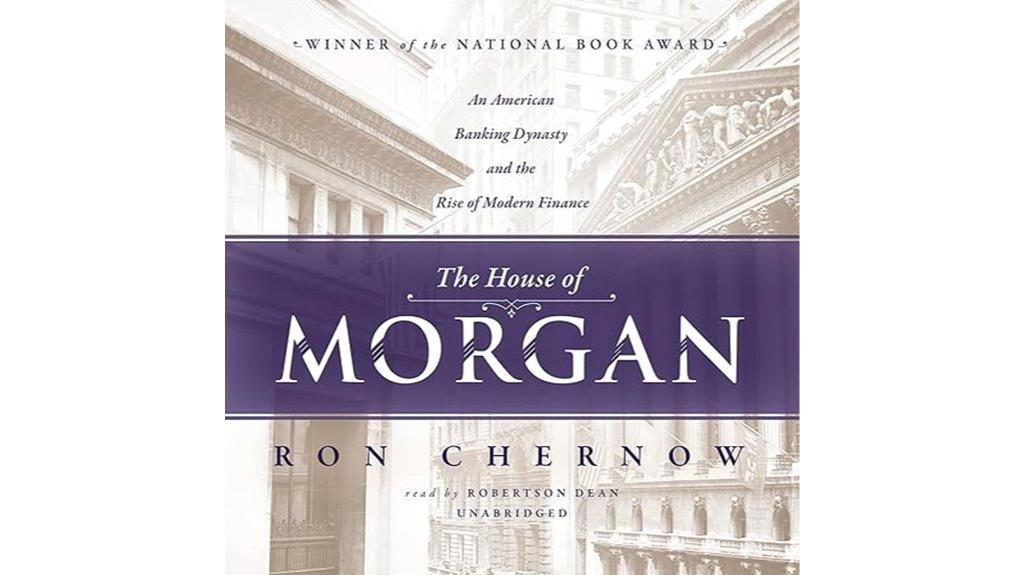
If you’re fascinated by the intersection of finance, politics, and history, then “The House of Morgan” offers a compelling exploration into one of America’s most influential banking dynasties. Authored by Ron Chernow, it traces over 150 years of the Morgan family’s impact on global finance, from its origins with Junius Morgan to J.P. Morgan’s pivotal role in shaping U.S. and world economies. The book covers major events like WWI, WWII, and international debt crises, revealing how the bank’s influence extended beyond banking into politics and global affairs. It’s a detailed, engaging history that demonstrates how vision, resilience, and strategic relationships built a financial empire.
Best For: readers interested in the deep history of American finance, the Morgan banking dynasty, and the intersection of banking, politics, and global affairs.
Pros:
- Provides a comprehensive and detailed account of over 150 years of banking history and influential personalities.
- Engages readers with vivid storytelling, personal letters, and meticulous research.
- Explores the international influence of the Morgan bank and its role in major global events.
Cons:
- Later sections rely more on public records and less engaging material, which may reduce interest for some readers.
- The scope is vast, potentially leading to a less focused narrative and some repetitive details.
- Lacks in-depth analysis at its conclusion, leaving some readers wanting more critical insight.
Crazy Rich Book: Power, Scandal, Tragedy Inside Johnson & Johnson Dynasty

For readers fascinated by the dark side of wealth and family power, Crazy Rich Book: Power, Scandal, Tragedy Inside Johnson & Johnson Dynasty offers a gripping glimpse into one of America’s most influential dynasties. I was struck by how wealth distorts family dynamics, fueling greed, indulgence, and scandal. Despite their riches, many members struggle with personality flaws, broken relationships, and personal tragedy. The book reveals that excess can corrupt morals and priorities, making genuine happiness elusive. Juxtaposed with media sensationalism, it exposes a family’s moral struggles beneath their glamorous veneer. Ultimately, it’s a stark reminder that wealth alone doesn’t guarantee fulfillment or integrity.
Best For: readers interested in exploring the complex and scandalous realities of wealthy family dynasties and their moral dilemmas.
Pros:
- Engaging and fast-paced storytelling that combines gossip with insightful critique
- Offers a revealing look into the dark side of wealth and family power dynamics
- Thought-provoking themes about morality, happiness, and the influence of money
Cons:
- Frequent jumps between eras and confusing names can hinder comprehension
- Heavy reliance on sensationalism and gossip, sometimes lacking depth
- Poor quality photographs and a structure that may challenge readers seeking straightforward biography
The Billionaires Apprentice: How 21 Billionaires Used Drive, Luck and Risk to Achieve Colossal Success

The Billionaires Apprentice is an ideal starting point for entrepreneurs and business enthusiasts who want quick, motivational stories of how some of the world’s wealthiest individuals achieved success. It offers brief biographies of 21 billionaires, highlighting their drive, luck, and risk-taking. Although it’s easy to read and inspiring, the book is somewhat superficial, with typos and factual errors that can be distracting. Still, it shows that becoming a billionaire can be surprisingly accessible and that persistence and boldness often pay off. This collection serves as a motivational primer, encouraging further exploration into the fascinating world of wealth creation.
Best For: entrepreneurs and business enthusiasts seeking quick motivation and high-level insights into billionaire success stories.
Pros:
- Inspiring and motivational stories that highlight drive, luck, and risk-taking.
- Easy-to-read, high-level overview suitable for beginners.
- Encourages further research and exploration of wealth-building journeys.
Cons:
- Contains numerous typos and grammatical errors that can be distracting.
- Superficial biographies lacking depth and detailed analysis.
- Factual inaccuracies and inconsistencies that undermine credibility.
Business Biographies and Memoirs: 6 Manuscripts
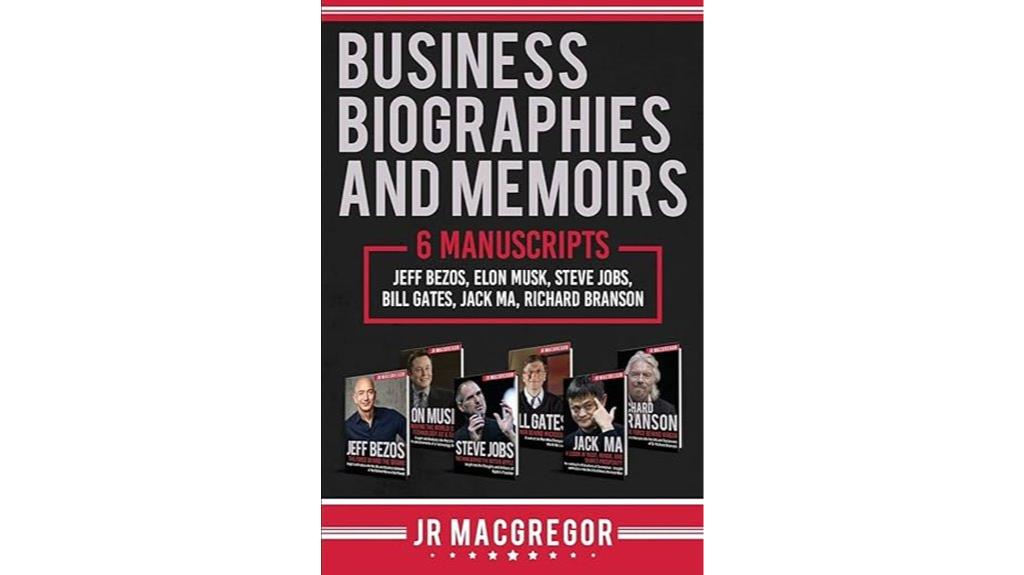
Anyone passionate to learn from the real stories behind some of the world’s most successful entrepreneurs will find these six manuscripts a treasure trove. These biographies of Jeff Bezos, Elon Musk, Steve Jobs, Bill Gates, Jack Ma, and Richard Branson offer deep insights into their personal struggles, professional triumphs, and character traits. They reveal how humble beginnings, failures, and relentless drive shaped their success. The stories are inspiring, showing that flaws and mistakes are part of the journey. With engaging, straightforward writing, these books deliver practical lessons on resilience, innovation, and perseverance—perfect for entrepreneurs, students, and anyone eager to understand the true nature of business mastery.
Best For: entrepreneurs, students, and business enthusiasts seeking inspiring and insightful biographies of the world’s top business leaders.
Pros:
- Provides deep personal and professional insights into renowned entrepreneurs’ journeys.
- Motivates readers through stories of overcoming failures and relentless perseverance.
- Engaging and straightforward writing makes complex business lessons accessible.
Cons:
- Occasional lack of structured organization can disrupt the reading flow.
- Some topics may be covered in a jumpy or delayed manner, affecting coherence.
- Expectation of physical copies may not align with Kindle editions, leading to potential frustration.
The Unknown Billionaires Book
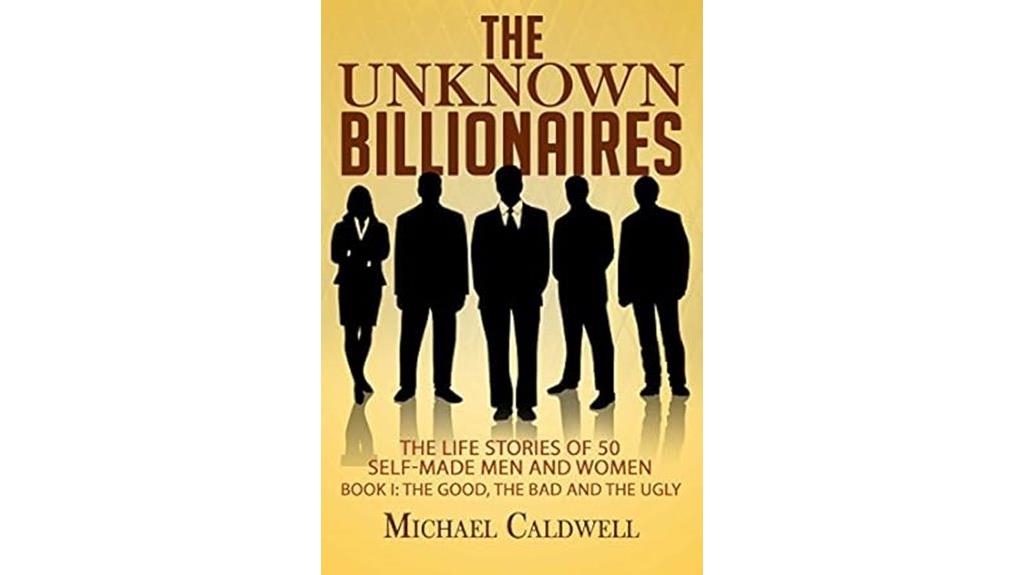
If you’re looking for inspiring stories of self-made billionaires who aren’t household names, “The Unknown Billionaires Book” offers a compelling collection. It features brief yet insightful profiles of 50 entrepreneurs who built their wealth through perseverance, often overcoming significant challenges. These stories prove you don’t need fame or recognition to succeed; passion and innovation matter most. Reading about how these entrepreneurs started from scratch and achieved extraordinary results gave me hope and a fresh perspective on wealth creation. The narratives are engaging, with interesting anecdotes that keep you motivated. This book reminds us that success often comes from niche markets and relentless determination.
Best For: readers interested in inspiring, lesser-known success stories of self-made billionaires who achieved wealth through perseverance and innovation.
Pros:
- Provides diverse and motivational profiles of 50 self-made billionaires, emphasizing perseverance over fame.
- Short, engaging stories packed with insightful anecdotes that inspire entrepreneurship and wealth-building.
- Highlights that success can come from niche markets and personal determination, offering hope to aspiring entrepreneurs.
Cons:
- Some readers may find the narrative style too gossipy or lacking in a serious tone.
- The book could benefit from clearer navigation features, such as chapter headings or summaries.
- Political commentary scattered throughout may detract from the focus on entrepreneurial stories.
Zeckendorf Autobiography of Real Estate Mogul
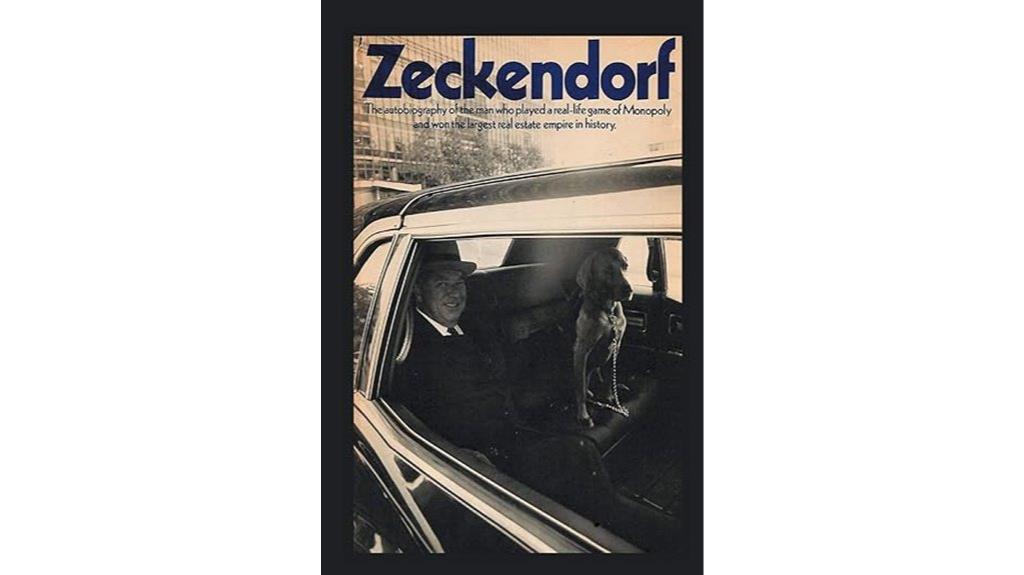
For readers enthusiastic to understand the mindset and strategies behind one of the most influential real estate developers, William Zeckendorf’s autobiography stands out as a top choice. I found his story engaging, humorous, and candid, revealing how his street smarts, book knowledge, and boldness fueled his rapid rise. Zeckendorf’s ability to see cities holistically, recognize future trends, and push through complex projects like the UN building shows his mastery in deal-making and urban transformation. His fearless approach, combined with strategic vision and financial acumen, offers invaluable lessons. This autobiography not only highlights his successes but also his resilience and unique character, inspiring anyone aiming to reshape their industry.
Best For: aspiring real estate developers, urban planners, and business strategists interested in understanding high-stakes deal-making and city transformation through the lens of William Zeckendorf’s visionary career.
Pros:
- Offers vivid, candid insights into high-level real estate deal structures and negotiations.
- Highlights Zeckendorf’s strategic foresight and innovative approach to urban development.
- Provides inspiring anecdotes and lessons on resilience, creativity, and masterful deal-making.
Cons:
- The narrative can sometimes feel disorganized or less cohesive, making it slow at points.
- Lacks exhaustive detail on failures and specific lessons learned from setbacks.
- Focuses heavily on Zeckendorf’s successes, with limited broader contextual or personal life lessons.
The Tycoons Book on American Economy

The Tycoons stands out among the “12 Best Billionaire Biographies” as an essential read for those interested in understanding the roots of America’s economic dominance. It vividly recounts how industrial revolution pioneers transformed the nation between 1830 and 1900, emphasizing capitalism’s benefits despite its excesses. The book highlights the rise of figures like Carnegie, Rockefeller, Gould, and Morgan—ruthless yet impactful entrepreneurs shaping industries like steel, oil, and finance. It also explores how their aggressive tactics spurred legislation and laid the groundwork for America’s global economic leadership. For anyone curious about the complex forces behind America’s rise, this book offers a compelling, balanced perspective.
Best For: readers interested in understanding the historical roots of America’s economic power and the complex legacy of its industrial magnates.
Pros:
- Provides a detailed, balanced, and accessible overview of America’s industrial revolution and key entrepreneurs.
- Offers insights into how ruthless business tactics contributed to national economic growth and global influence.
- Highlights the broader societal changes and legislation that shaped modern American capitalism.
Cons:
- Some passages are dense or highly technical, which may challenge casual readers.
- The portrayal of the tycoons may be seen as somewhat sympathetic, potentially downplaying their unethical practices.
- Focuses heavily on economic and industrial aspects, with less emphasis on social or labor impacts.
Billion Dollar Whale Book
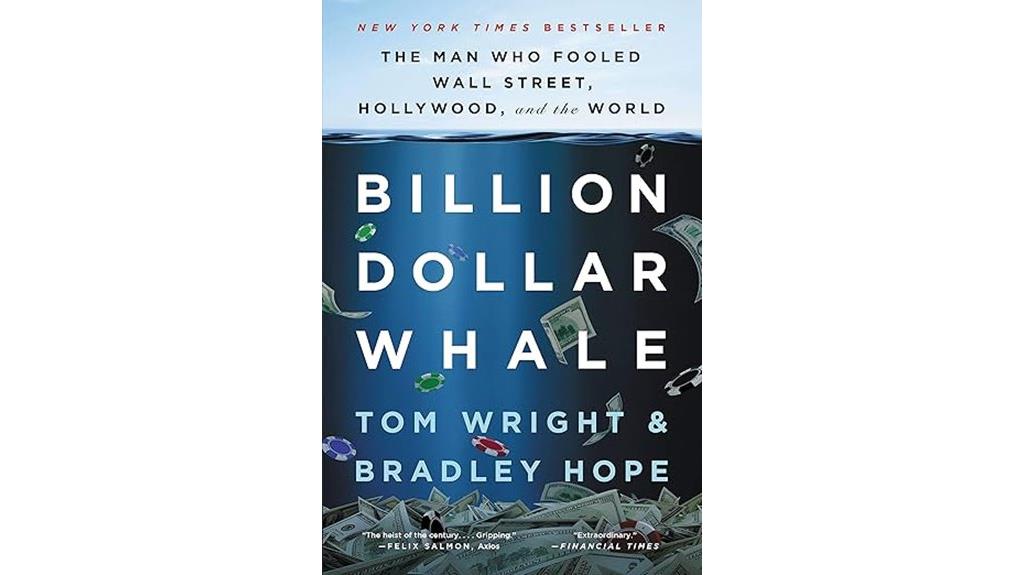
Billion Dollar Whale stands out as a must-read for those interested in thorough explorations into financial fraud and systemic corruption. I was captivated by Tom Wright and Bradley Hope’s detailed account of Jho Low’s massive theft from Malaysia’s 1MDB fund. The book reveals how Low exploited global financial institutions—Goldman Sachs, JP Morgan, and others—highlighting systemic failures and the complicity of banks, law firms, and regulators. Their engaging storytelling exposes greed, political ties, and vulnerabilities in the system that allowed this scandal to unfold. It’s a sobering reminder that unchecked power and corruption can thrive without proper oversight, making this a essential read for aspiring success stories.
Best For: readers interested in understanding global financial fraud, systemic corruption, and the detailed mechanics behind major financial scandals like 1MDB.
Pros:
- Well-researched and engaging investigative storytelling that offers detailed anecdotes.
- Provides a comprehensive overview of systemic failures involving global financial institutions.
- Highlights important issues of political corruption, greed, and oversight vulnerabilities.
Cons:
- Lacks extensive citations, appendices, or detailed source references.
- Focuses heavily on narrative and anecdotal accounts, which may limit academic rigor.
- Some readers may find the portrayal of luxury and celebrity culture distracting from the core financial issues.
Factors to Consider When Choosing Billionaire Biographies

When selecting a billionaire biography, I look for authentic content that offers genuine insights into their journey. I also consider how thoroughly the book covers their business successes and personal struggles, along with the quality of the writing. Additionally, I pay attention to the ethical perspectives presented to guarantee a balanced and honest portrayal.
Authenticity of Content
Choosing a credible billionaire biography starts with evaluating the author’s background and research practices. I look for authors with strong credentials and a track record of thorough research, ensuring they use credible sources. Cross-referencing key facts and anecdotes with multiple reputable sources helps verify accuracy and build confidence in the story. Transparency about any biases or conflicts of interest is also vital, as it indicates honesty and objectivity in portrayal. I pay attention to citations, references, or footnotes that support claims—these show a well-sourced narrative. Be cautious of biographies filled with factual inaccuracies, exaggerated claims, or sensational stories, as they undermine authenticity. Ultimately, authentic content hinges on credible sourcing and honest storytelling, guiding me toward biographies that are both inspiring and trustworthy.
Depth of Personal Insights
Deep personal insights are essential for understanding what truly drives a billionaire’s success and leadership style. These insights reveal character traits, motivations, and emotional struggles that influence their decisions. Well-crafted biographies often include anecdotes, reflections, and interviews, giving a nuanced view of the individual beyond business achievements. The level of personal detail helps readers connect and grasp the context behind successes, failures, and ethical choices. Rich insights delve into psychological aspects like ambition, resilience, and vulnerabilities, making the story more relatable and inspiring. This depth also allows us to see the human side of wealth, offering lessons in humility, perseverance, and personal growth. Choosing biographies with profound personal insights ensures a more authentic, comprehensive, and impactful reading experience.
Business Success Highlights
Understanding the personal side of a billionaire’s story is valuable, but it’s equally important to look at how they built their wealth through strategic business moves. When choosing biographies, I focus on key moments of growth—like product launches, market expansions, or strategic investments—that reveal how success was achieved. I look for stories that detail decision-making, including risks taken and challenges faced, offering insight into their paths to wealth. Innovative strategies, disruptive ideas, and unique business models that set these entrepreneurs apart are also essential. I pay attention to milestones and turning points, illustrating how adaptability and persistent effort led to significant milestones like revenue growth or successful exits. Concrete data and achievements help me understand the tangible impact of their business acumen.
Writing Style Quality
A well-crafted billionaire biography should have a clear, engaging writing style that makes complex business stories easy to follow. I look for biographies that use vivid storytelling, detailed anecdotes, and a compelling voice to keep me hooked. Accurate facts and thoughtful analysis boost credibility and guarantee I trust what I’m reading. A good style balances technical insights with personal stories, making the content both informative and emotionally resonant. On the other hand, poor writing—filled with grammatical errors, filler, or inconsistent tone—can distract and diminish the learning experience. Ultimately, I value biographies where the writing elevates the story, making it accessible, engaging, and inspiring without sacrificing depth or clarity. That’s what transforms good stories into truly inspiring reads.
Ethical Perspectives Shown
When choosing a billionaire biography, I find it helpful to think about how the book handles ethical perspectives. I look for stories that highlight the dilemmas the billionaire faced and how they navigated moral challenges in their business pursuits. It’s important to see if the biography offers a balanced view, acknowledging both achievements and potential ethical shortcomings or controversies. I also consider whether the book explores the impact of their actions on society, employees, and stakeholders, as this reveals their true ethical stance. Additionally, I value narratives that discuss integrity, social responsibility, and ethical decision-making as key factors behind success. Ultimately, I want a story that emphasizes moral principles alongside profit motives, providing a well-rounded perspective on their character.
Historical and Cultural Context
Considering the historical and cultural context of a billionaire’s life is essential because it reveals how societal norms, economic conditions, and major events shaped their opportunities and choices. Understanding the era in which they lived helps explain why certain industries thrived or struggled, highlighting technological advances, political climates, and global conflicts that influenced their strategies. Recognizing a person’s cultural background provides insights into their motivations, values, and behaviors, which can differ greatly across societies and periods. Additionally, knowing the economic environment, such as periods of boom or recession, allows us to assess the risks they faced and how systemic issues like inequality and regulation impacted their paths. This context enriches our understanding of their success stories, making biographies more meaningful and inspiring.
Source Credibility
Evaluating the credibility of a billionaire biography guarantees you’re getting accurate and trustworthy insights. First, I check the author’s credentials—are they experts in finance, history, or journalism? This helps guarantee they have a solid background to interpret complex stories. Next, I look for well-sourced content, like primary documents, interviews, or reputable research, which adds reliability to the narrative. I also consider whether the book has been fact-checked or reviewed by reputable critics or experts—this signals rigorous accuracy. Be wary of biographies that rely on sensationalism, gossip, or unverified anecdotes without proper sourcing. Lastly, I consider the publisher’s reputation; those associated with academic or journalistic standards tend to uphold higher integrity, giving me confidence in the biography’s credibility.
Inspirational Value
The most inspiring billionaire biographies are those that vividly showcase stories of overcoming adversity and demonstrating resilience. I look for narratives that highlight personal growth through failures, as they remind me that setbacks are part of success. Biographies that reveal innovative thinking and bold risk-taking encourage me to pursue my own ambitious goals without fear. Authentic stories of struggle make the journey relatable, fostering an emotional connection that fuels motivation. When a story emphasizes perseverance and achievement, it serves as a powerful reminder that persistence and determination are essential for extraordinary success. These biographies don’t just tell about wealth; they inspire action by illustrating that resilience and grit can turn dreams into reality. That’s what makes them truly impactful.
Frequently Asked Questions
Which Biographies Offer the Most Actionable Leadership Lessons?
If you’re looking for biographies with actionable leadership lessons, I recommend reading Elon Musk’s story. It shows how perseverance and innovation drive success, even through setbacks. Warren Buffett’s life teaches patience and disciplined decision-making. Additionally, Sheryl Sandberg’s journey highlights the importance of resilience and authentic leadership. These stories give practical insights you can apply today, inspiring you to lead with purpose, resilience, and strategic thinking.
Are These Books Suitable for Aspiring Entrepreneurs?
Absolutely, these biographies are perfect for aspiring entrepreneurs. I’ve found that they offer not just inspiring stories but also practical insights into leadership, resilience, and strategic thinking. Reading about how billionaires overcame challenges helps me understand real-world business nuances. They motivate me to push forward, learn from failures, and innovate. If you’re looking for actionable lessons wrapped in compelling stories, these books are a must-read for your entrepreneurial journey.
How Accurate Are the Portrayals of These Billionaires’ Lives?
I find that these biographies are generally quite accurate, but they can sometimes be romanticized or simplified. I love how they offer insights into these entrepreneurs’ journeys, yet I stay mindful that some details might be exaggerated or glossed over. Personally, I take the stories as inspiration rather than pure fact, knowing that the essence of their perseverance and innovation remains true and motivating.
Do These Biographies Cover Ethical Aspects of Wealth Accumulation?
These biographies often skip the full story on ethics, but some do explore the moral dilemmas and controversial choices these billionaires faced. I’ve seen a few that honestly explore the gray areas of wealth-building, making you think twice about the cost of success. If you’re looking for a balanced view that includes ethical considerations, I recommend digging into those that don’t shy away from tough questions.
Which Books Are Best for Understanding Economic and Industry Impacts?
If you want to understand economic and industry impacts, I recommend “The Snowball” by Alice Schroeder for Warren Buffett’s investment philosophy, “Sapiens” by Yuval Noah Harari for broad economic history, and “Bad Blood” by John Carreyrou for insights into biotech industry dynamics. These books offer comprehensive explorations into how industry shifts shape economies and influence markets, giving you valuable perspectives on economic forces at play.
Conclusion
Diving into these billionaire biographies feels like opening a treasure chest of inspiration. Each story is a stepping stone, a spark to ignite your own success journey. Remember, even the tallest skyscrapers started with a single brick. So, pick your favorite, learn from their triumphs and setbacks, and let their stories be the wind beneath your wings. After all, greatness often begins with a single bold leap.










